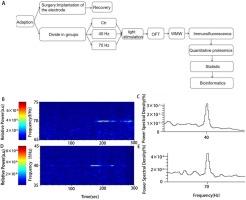High-gamma frequency flash stimulation as a possible cognitive facilitator in rat pups
IF 2.6
4区 医学
Q3 NEUROSCIENCES
引用次数: 0
Abstract
High-gamma frequency flashes can enhance cognition by synchronizing neural oscillations in mammals. Early flash treatment promotes the development of improved cognitive functions in young children. However, it is unclear whether exposure to high-gamma frequency flashes in preschool-aged individuals affects cognition in preadolescents by regulating neural oscillations in the brain. Here, we aimed to investigate the effects of gamma-frequency flashes on cognitive ability. In this study, the effect of high-frequency flicker on cognitive performance was verified by behavioural experiments such as the open-field test and the water maze, but also proteomics. We found that external 40 Hz and 70 Hz frequency flashes synchronized neural oscillations at the corresponding frequencies in the primary visual cortex (V1) of rats. Rats that underwent 70 Hz flash intervention had better cognitive behavioural performance in the early stages of training. The 70 Hz flash frequency upregulated proteins associated with neuronal growth and differentiation, such as Snapin, FoxO3, Hspa12a, and Penk, and activated the MAPK signalling pathway, signalling pathway regulating stem cell pluripotency, and the neuroactive ligand-receptor interaction pathway. These proteins and pathways play important roles in cognitive functions. Our study revealed that 70 Hz flashes received by young children early in their development substantially promote the growth of cognitive capabilities in the brain. Exposure to 70 Hz flashes may be a new intervention method and a new strategy for improving cognition.

高伽马频率闪光刺激可能促进大鼠幼崽的认知能力
高伽马频率闪光可以通过同步哺乳动物的神经振荡来提高认知能力。早期闪光治疗可促进幼儿认知功能的改善。然而,学龄前儿童接触高伽马频率闪光是否会通过调节大脑神经振荡来影响青春期前儿童的认知能力,目前尚不清楚。在此,我们旨在研究伽马频率闪光对认知能力的影响。在这项研究中,高频闪烁对认知能力的影响通过开阔地测试和水迷宫等行为实验以及蛋白质组学得到了验证。我们发现,外部 40 赫兹和 70 赫兹频率的闪烁能使大鼠初级视觉皮层(V1)中相应频率的神经振荡同步。接受70赫兹闪光干预的大鼠在训练初期的认知行为表现更好。70赫兹闪光频率会上调与神经元生长和分化相关的蛋白质,如Snapin、FoxO3、Hspa12a和Penk,并激活MAPK信号通路、调节干细胞多能性的信号通路以及神经活性配体-受体相互作用通路。这些蛋白和通路在认知功能中发挥着重要作用。我们的研究发现,幼儿在发育早期接受 70 赫兹闪光,会大大促进大脑认知能力的增长。接触 70 赫兹闪光可能是一种新的干预方法和改善认知的新策略。
本文章由计算机程序翻译,如有差异,请以英文原文为准。
求助全文
约1分钟内获得全文
求助全文
来源期刊

Brain Research
医学-神经科学
CiteScore
5.90
自引率
3.40%
发文量
268
审稿时长
47 days
期刊介绍:
An international multidisciplinary journal devoted to fundamental research in the brain sciences.
Brain Research publishes papers reporting interdisciplinary investigations of nervous system structure and function that are of general interest to the international community of neuroscientists. As is evident from the journals name, its scope is broad, ranging from cellular and molecular studies through systems neuroscience, cognition and disease. Invited reviews are also published; suggestions for and inquiries about potential reviews are welcomed.
With the appearance of the final issue of the 2011 subscription, Vol. 67/1-2 (24 June 2011), Brain Research Reviews has ceased publication as a distinct journal separate from Brain Research. Review articles accepted for Brain Research are now published in that journal.
 求助内容:
求助内容: 应助结果提醒方式:
应助结果提醒方式:


